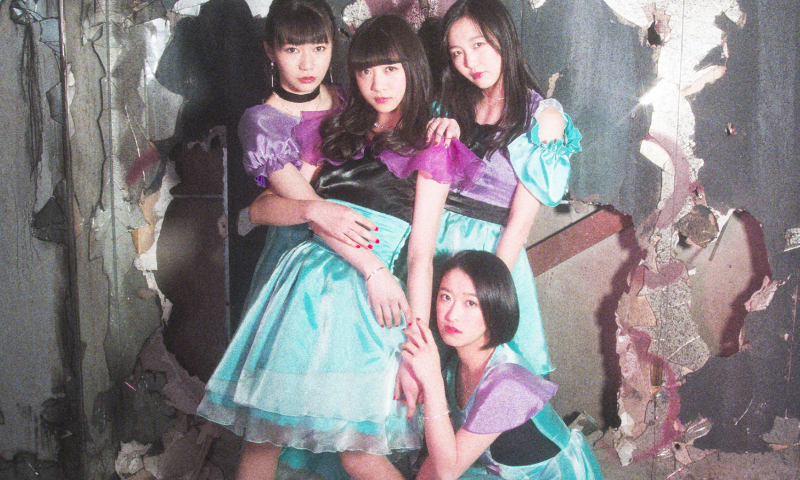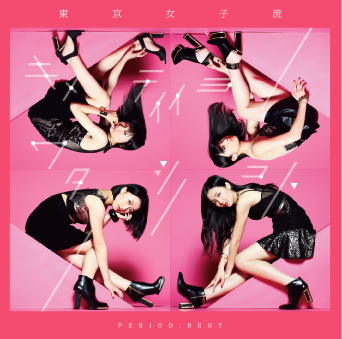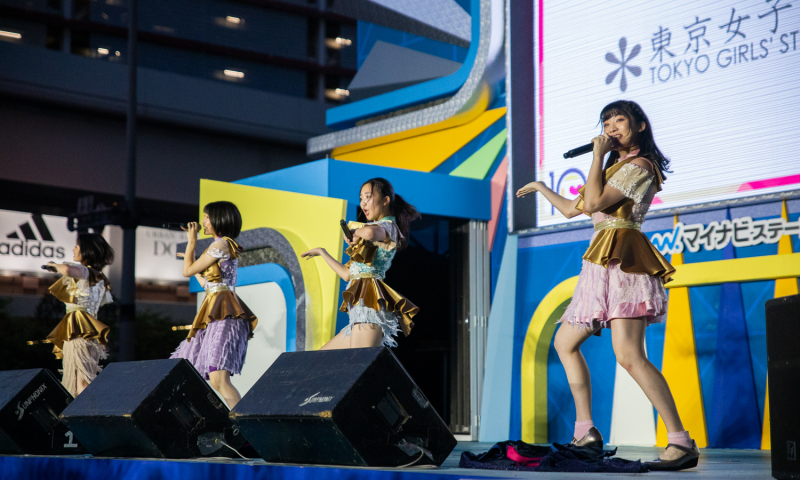
TIF 2019: TOKYO GIRLS’ STYLE Shines on Stage With a Veteran-worthy Performance
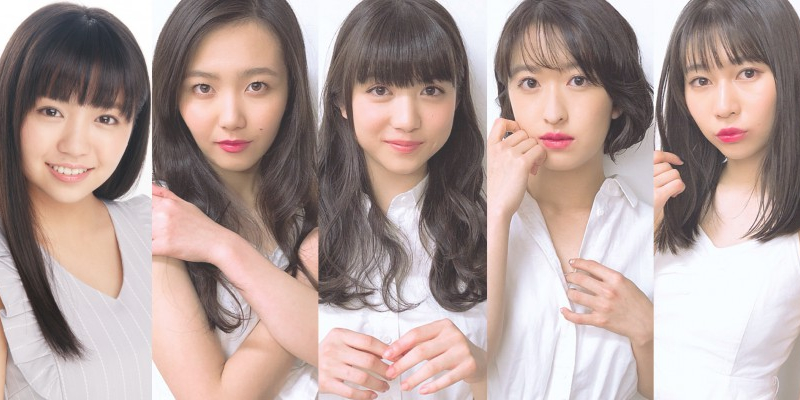
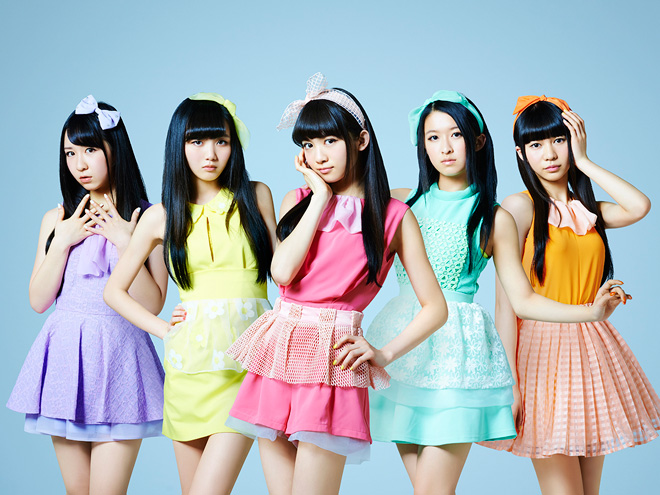
Sponsored Links
The reason TOKYO GIRLS’ STYLE’s artist declaration caused a stir
東京女子流の「アーティスト宣言」が波紋を呼んだ理由
TOKYO GIRLS’ STYLE proclaimed they would be artists during their solo concert in Shibuya Public Hall on December 20, 2014 and in Osaka BIGCAT on December 30, 2014.
東京女子流が「アーティスト」になることを宣言したのは、2014年12月20日の渋谷公会堂で のワンマンライヴと、2014年12月30日の大阪BIGCATでのワンマンライヴでのことだった。
Although TOKYO GIRLS’ STYLE can fall under the category of “idols,” why would they classify themselves as artists? The details were explained by project director/artist and repertoire Yoshiyasu Satake and the members during their “TOKYO GIRLS’ STYLE Declaration” Ustream on January 5, 2015. Timing this with their 6th year as a unit, they said they would ultimately go with their concept of a “girls dance and vocal group,” which they have had since the beginning. They announced from now on, they will no longer perform in idol festivals, appear in idol-specific magazines, and will no longer perform their songs “Onaji Kimochi” and “Ganbatte Itsudatte Shinjiteru.”
「アイドル」にカテゴライズされてきた東京女子流が、なぜ今「アーティスト」を宣言するのか? その詳細は、2015年1月5日に配信された東京女子流のUstream「アーティスト東京女子流宣言へ」で、A&Rでありプロジェクト・ディレクターである佐竹義康とメンバーにより説明された。結成6年目を迎えるタイミングで、当初から名乗っていた「ガールズ・ダンス& ボーカルグループ」としての姿を突き詰めていくという。今後は、アイドルフェスへの出演をせず、アイドル専門誌にも露出せず、しばらくは「おんなじキモチ」や「頑張っていつだって信じてる」といった楽曲を披露しないこともアナウンスされた。
So why did this artist declaration stir up controversy between idol otakus? It might be a feeling that’s a little difficult for overseas fans to understand.
この東京女子流の「アーティスト宣言」は、なぜ日本のアイドルオタクの間で物議をかもしたのか? 海外で日本のアイドルを愛好する人々にはわかりづらい感覚かもしれない。
One thing is for sure, and that is idols and artists have different values in Japan.
ひとつ言えることは、日本では「アイドル」と「アーティスト」は価値の異なる存在のように語られている、ということだ。
Let me say the most important fact. In Japan, it is highly believed that artists are above idols. This is the biggest cause of the surprise, confusion, and repulsion that came after TOKYO GIRLS’ STYLE’s declaration. People thought, “TOKYO GIRLS’ STYLE is going to be negative about idols and become artists?”
一番大切なことを言おう。「アイドル」は「アーティスト」よりも下のものだ、という偏見 が日本には根強く残っているのだ。これが東京女子流の「アーティスト宣言」への驚き、困惑、そして反発の最大の要因だ。「東京女子流は『アイドル』を否定して『アーティスト』になるのか?」と。
The definition of “idols” in Japan
日本における「アイドル」とは
Well, what’s the definition of an “idol” in Japan? It’s believed to be a genre where even if they aren’t very good at singing or dancing, if their music or sound production isn’t that great, as long as they have a cute face they can work as an idol. では日本における「アイドル」とはどんなものだろうか? それは、歌唱やダンスがうまくなくても、楽曲やサウンド・プロダクションが良くなくても、顔さえ可愛ければ活動できるものだ、という見方がいまだに残っているジャンルなのだ。
The idol boom that came after AKB48’s big break created an opportunity to structure idols. It is true that there are idols whose singing and dancing aren’t that great and with music and sound production that isn’t amazing either. But we also want to explain that there are idols in the complete opposite position, where they are good at singing and dancing and do produce great music.
AKB48の大ブレイク以降のアイドルブームは、アイドルが濫造される状況も生んだ。たしか に、歌唱もダンスもうまくなければ、楽曲やサウンド・プロダクションも良くないアイドルはいる。しかし、その真逆のアイドルも存在することは読者の皆さんがご存知の通りだ。
The same thing can go for musicians that can be classified as “artists.” There are musicians who aren’t very good at singing or dancing, and they are treated as “artists.”
同じことは「アーティスト」に分類されるようなミュージシャンにも言える。楽曲が良くな くても、歌唱がうまくなくても「アーティスト」として扱われるミュージシャンはいるわけだ。
Japan’s definition of “artist”
日本における「アーティスト」とは
For a performer to be called an “artist,” calling their own plays is commonly a huge factor. Originally, the artist would sing a song created by a lyricist, composer, and arranger that would become a popular song. The prosperity of the singers from from the 1960s folk to the 1970s new music singers shows a remarkable case.
演者が「アーティスト」と呼ばれるためには、一般的には自作自演が大きな要素だ。それは本来、専門の作詞家や作曲家、編曲家による楽曲を歌ってきた、日本の歌謡曲のシステムに対抗 するものであった。1960年代以降の「フォーク」、1970年代以降の「ニューミュージック」における自作自演歌手の隆盛はその顕著な事例だ。
But since the 1990s, the popularity of J-POP (which began to represent all of Japanese music) caused ambiguity between “artists” and “idols.” “Artists” and “idols” were lined up together in CD shops under “J-POP” and “artists” became obsolete. しかし1990年代以降、日本のポピュラー音楽全体を表現とする「J-POP」という単語によって、「アーティスト」と「アイドル」の境目は曖昧にされた。CDショップでは、「J-POP」の 名のもとに「アーティスト」と「アイドル」のCDは同じ棚に並べられた。「アーティスト」は 陳腐化したのである。
Originally, if we look back on the history of Japanese idol music, the founders of Japan’s rock music HAPPY END, YMO (Yellow Magic Orchestra), moonriders provided music for idols a number of times. Rock musicians still provide music for idols currently, and it should be banned to say idol music is inferior to singer songwriter musicians.
そもそも、日本のアイドル音楽の歴史を振り返れば、日本のロックの礎となったはっぴいえんど、YMO(Yellow Magic Orchestra)、ムーンライダーズといったバンドのメンバーが、アイドルに多数の楽曲提供をしてきた事実がある。現在もロックミュージシャンによるアイドルへの楽曲提供は多い。アイドルの音楽が自作自演歌手の音楽より劣るものだという偏見は否定されるべきなのだ。
In the recent years, there have been more opportunities for idols to perform in Japan’s rock festivals. Even enough to say it has been normalized.
近年、日本のロックフェスにアイドルも出演する機会が増えたことも、日本のポピュラー音楽の歴史から見ればむしろ「正常化」と言っていいのだ。
The significance of making an artist declaration
「アーティスト宣言」をする意義
So what actually separates idols from artists? By calling oneself an artist is a strategy to improve their image. Perfume’s transition, who started as idols and became artists with the help of their incredible dance performance, is still fresh in our minds.
それでも「アイドル」と「アーティスト」を隔てるものは何だろうか? ひとつは「アーティスト」を名乗ることによるイメージ戦略だろう。アイドルを出自とするPerfumeが、そのダンスパフォーマンスの実力をもってアーティスト路線になったことは記憶に新しい。
Idol culture has idol otakus, who are prone to prejudice from fans and society. There are idols who have become so famous that it is no longer an issue to talk about them at work with colleagues. These 21st century idols are from Hello! Project, which produced Morning Musume, the AKB48 family, Momoiro Clover Z, and Dempagumi. inc. Fans who support preteen idols are considered to be lolicons… even though they’re the first to discover the potential of these young girls.
アイドルという文化は、アイドルオタク、つまりファンの側も社会からの偏見を受けやすい。会社で同僚と話題にしても問題がないほどメジャーな存在になったアイドルは、21世紀以降はモーニング娘。を筆頭とするハロー!プロジェクト、AKB48ファミリー、ももいろクローバーZ、そしてやっとでんぱ組.incといったところだろう。ローティーンのアイドルを応援するファンは、しばしばロリコン扱いされる。誰よりも先に新しい才能を発見するのは彼らなのに。
And within all this prejudice, TOKYO GIRLS’ STYLE’s singing and dancing abilities were never properly evaluated. And because of that, we should welcome the members, as well as the staff, decision to make this artist declaration. TOKYO GIRLS’ STYLE aren’t idols, they are a 5-member girls singing and dancing unit.
こうした偏見の中では、東京女子流の歌唱やダンスの実力が正当に評価されないこともあるだろう。その意味で、彼女たちやスタッフが「アーティスト宣言」をして実力で勝負していこうとする姿勢は歓迎させるべきものなのだ。東京女子流とは、本来「アイドル」ではなく「5人組ガールズ・ダンス&ボーカルグループ」なのだから。
But due to the vague announcement made on January 5, 2015, there must be some insecurities among the fans.
ただ、2015年1月5日にUstreamで配信された発表で、今後についての明確なヴィジョンを提示できなかったことが、ファンの不安を大きくさせた面はあるだろう。
Using the title of “idol” as a weapon
武器としての「アイドル」という肩書
Although we have been mentioning “idols” as a negative term, there are things idols can do because they are idols. For example, Bis (who disbanded on July 2014) performed rock-oriented music and activity, acted foolishly and very far from idol-like until the end. “Idol” is a form of beauty. That’s why there’s an advantage in using “idol” as a weapon.
ここまで「アイドル」という言葉のネガティヴな面ばかりに言及してきたが、その一方で「アイドル」だからこそできることもある。たとえば2014年7月に解散したBiSは、ロック寄りの音楽性と活動姿勢、そして馬鹿馬鹿しいユーモアと露悪性によって「アイドルらしくない」と最後まで言われ続けた。「アイドル」とは様式美だ。だからこそ「アイドル」のパブリックイメージを逆手にとることは武器にもなりうる。
Video from “BiS Kaidan”, BiS’s collabo unit with noise band “HijoKaidan”
動画はBiSと非常階段のコラボユニット「BiS階段」より
The term “idol” comes with the negative connotation that they are flirtatious, but their kitsch part is easily picked up on. When the video clip of Momoiro Clover Z’s collaboration with KISS released in January 2015, it created huge commotion that a Japanese idol group collaborated with a big American rock band.
また、「アイドル」のコケティッシュな面はネガティヴに捉えられがちだが、キッチュな面 は面白がられやすい。2015年1月にヴィデオ・クリップが公開された、ももいろクローバーZとKISSの共演曲「夢の浮世に咲いてみな」も、日本の「アイドル」がアメリカの大物ロックバンドと共演したからこそ大きなインパクトを生み出しているのだ。
What Japanese idol otakus are truly seeking
日本のアイドルオタクが真に求めているもの
The current definition of the “artist” title often means that they hold authority of their work. But on the other hand, idols may not have authority of their work, but they are their own diverse culture with a lot of potential. Whether a performer wishes to be an artist or idol, that is up to them and their qualifications.
現在において「アーティスト」という肩書きは、往々にして旧来の自作自演歌手が手にしてきた権威の再利用に過ぎない。その一方で、「アイドル」はそうした権威こそないものの、独自の文化としての多様性、可能性を持っている。「アーティスト」と「アイドル」のどちらの 側面を押し出すかは、その演者の資質によって決められるべきものだろう。
Japanese idol otakus are thought to to seek an idol’s narrative. But fans are actually seeking something a lot more simple: excellent music, singing, dancing, and live performances. As long as the CDs, artwork on the merchandise are refined and the idol’s concept is refined, it’s all good.
日本のアイドルオタクは、アイドルに物語性を求めがちである。しかし、本来ファンが求めているものはもっと単純なものだ。優れた楽曲、歌唱、ダンス、ライヴパフォーマンス。CDやグッズのアートワークが洗練されていたり、アイドルとしてのコンセプトが練られていたりすればなお良い。
As long as the components are met, regardless of whether the musician is an idol or artist, they will ultimately receive the support from their fans. Even if handshake events and photo opportunities cease to exist.
そうした要素を満たすことができれば、演者が「アイドル」だろうと「アーティスト」だろうと、最終的にはファンの支持は得られるはずだ。たとえ握手会やチェキ会がなくなってしまったとしても。
To be honest, the difference doesn’t matter when it comes to idols or artists with the difficulty to appealing to fans. It may be easier to sell the idea of the idol boom coming from the popularity of the idols, but it may actually come from artists who have secured their activity. Whether they decide to go by an idol or artist, it’s like they are climbing same mountains with different routes, and not all that difference.
そして、アイドルオタクのようなコア層ではない一般層にまで演者が訴求することの困難さ は、実は「アイドル」でも「アーティスト」でも変わらない。アイドルブームの現在は「アイドル」であるほうが売れやすいだろうが、中長期的に見れば「アーティスト」のほうが息の長い活動を安定してできるかもしれない。「アイドル」を名乗るか「アーティスト」を名乗るかは、本質的には別々の登山道から山頂を目指している程度の違いに過ぎないのだ。
Translated by Misato
Sponsored Links
Tokyo Girls’ Style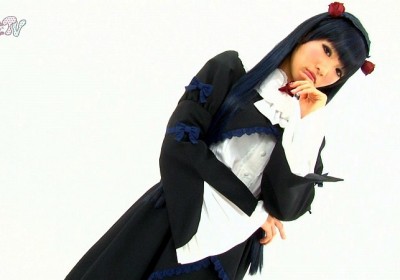
[Exclusive Program] Tokyo GIrls’ Update TV #006 : SBY in Shibuya109 & Pikarin’s Cosplay

“Nadeshico Sushi”, One of Japan’s Most Unique Sushi Restaurants Where Sushi Rolls are Made by Girls in Kimono!


